 |
 |
 |
During the 2009 close season, young starlet Fabian Delph left for Aston
Villa in a £7.5m move, though Jermaine Beckford remained at Elland Road,
despite being transfer listed after rejecting a new three-year deal, with
no one prepared to meet the rumoured asking price of The biggest new name was Leicester centre-back Patrick Kisnorbo, an Australian
international, while in October, the front line was bolstered by the arrival
of two loanees, Sam Vokes from Wolves and Leicester winger Max Gradel. A 2-0 victory against Stockport on 5 September was United's fourteenth
straight League win at home, breaking a record established in 1969. It
also set a record for successive wins in all competitions at the start
of a season, going one better than the seven achieved in 1973. United's unbeaten start came to an end at Millwall on 24 October but
they were back to form the following Tuesday night, running in four goals
without reply at Bristol Rovers. United pulled off a memorable victory over Manchester United in the FA
Cup at Old Trafford on 3 January, securing a historic victory by virtue
of Beckford's first half goal and a magnificent team display. Simon Grayson
claimed it as a 'fantastic day for this football club' as Leeds ended
a 29-year drought at the Theatre of Dreams. Strangely, the triumph triggered a loss of form in the League with many
laying the blame at the feet of Beckford's agent. With Beckford's contract
due to end in the summer, it was the final opportunity for Leeds to cash
in on him. Newcastle tabled a £1.25m bid, later increased to £1.8m, but
Ken Bates insisted they would wait for a 'ridiculous' offer. United enjoyed more FA Cup glory with a draw against star-studded Tottenham
at White Hart Lane before going out in the replay, but their League form
collapsed and they crashed 3-0 at Swindon on 26 January. Until two second half Becchio goals secured victory against Oldham on
23 February, United had taken seven points from the eight games played
since Old Trafford. Further draws against Huddersfield and Brentford left
them seven points behind Norwich. There was a massive collective sigh
of relief as they won 4-1 at Tranmere. But they continued to stutter, losing 1-0 to Southampton and then 2-0
at home to Millwall, with Patrick Kisnorbo's season ended by a ruptured
Achilles in the first five minutes. The replacement for Kisnorbo was Preston's Neill Collins, joining on
loan, as did 18-year-old Arsenal left winger Sanchez Watt. Collins played
at table-topping Norwich on 27 March and did well in a strong team performance,
but United lost again, and they did so once more, by three clear goals,
at home to Swindon on 3 April. The game seemed up. However, two rare goals from Richard Naylor earned three points at Yeovil
on 5 April and there were then straightforward victories against Southend
and Carlisle to keep United a point clear of Millwall in second. When the Lions lost a Friday evening fixture at Huddersfield, it left
United needing three wins from four games to confirm promotion. Leeds fans set off for Gillingham on 17 April convinced that they were
home and dry but by the 33rd minute the Kent side were 3-0 ahead and playing
the Whites off the park. United pulled two goals back but could not get
back on level terms. A week later, they made amends by beating MK Dons
4-1. On 1 May, Leeds were at Charlton, with Millwall visiting Tranmere. Former
United striker Ian Thomas-Moore and Andy Robinson, on loan from Elland
Road, scored as Tranmere won 2-0, the second goal coming just after the
hour. At that point Leeds were goalless at the Valley, but a win was required
to capitalise and Grayson went for it, bringing on Beckford, Grella and
Watt. It was Charlton, though, who scored with three minutes remaining.
The defeat made little difference: United still required victory in their
final game at home to Bristol Rovers to seal promotion. 8 May was a classic big day at Elland Road, the players understandably
tense, but there was no excuse for the behaviour of Max Gradel, who sought
retribution for a foul by Daniel Jones in the first half. The left-back
hit the floor like he'd been shot when Gradel stamped on him,Jerma sparking
chaotic scenes. Gradel was dismissed but refused to go quietly. It required
the physical intervention of Beckford and Doyle to drag him off the pitch. When Duffy gave Rovers the lead two minutes into the second half, Simon
Grayson threw Jonny Howson on for Lowry and within five minutes, the midfielder
had equalised. In the 63rd minute, Beckford pounced on a loose ball in
the area to give United the lead. Elland Road erupted; if Leeds could
hold on, they were up! The air was thick with tension as the clock ticked
agonisingly down and at the finish the massed ranks invaded the pitch
to celebrate with ecstatic players in the most positive moments that United
had enjoyed since their Champions League adventure. Beckford bade a fond farewell to Elland Road after promotion was secured,
ending a four-and-a-half year stay by completing his widely-anticipated
Bosman transfer to Everton. The main men coming in were goalkeeper Kasper
Schmeichel, son of Manchester United legend Peter, and Cardiff's Scot The team was unquestionably stronger than that relegated in 2007, and
they looked at ease in their new surroundings, but had to wait until their
third Championship fixture to register their first victory. Two memorable
goals from substitute Davide Somma ushered in an unbelievably positive
tone among United fans after the game as 'Somma-Time' rapidly became the
new catchphrase. United's steady advance was abruptly halted on 14 September at Barnsley
when they slumped to a 5-2 reverse. Connolly, Naylor and Bessone were
unceremoniously dropped and days later, Simon Grayson recruited Northern
Ireland international left-back George McCartney on loan. United were involved in an extraordinary game at home to Preston on 28
September. After falling behind in the fourth minute, Leeds came storming
back to lead 4-1 by the 39th minute, with Somma snaffling two of the goals.
Even when Jon Parkin pulled a goal back a minute later, the game seemed
in the bag. Cue a startling second half comeback with Preston rattling
in four goals to complete an astonishing 6-4 triumph. If Grayson was frustrated by that collapse he was apoplectic after the
following game, which saw United crash to a third successive home defeat,
by 4-0 to Cardiff City. He acted swiftly, recruiting Bolton centre-back
Andy O'Brien. O'Brien was given an immediate debut, on 30 October at Scunthorpe. United
secured their second win in six games, inspired by a hat trick from skipper
Jonny Howson in the space of fifteen second half minutes. Draws at Norwich and Reading and victory at Crystal Palace on 4 December
courtesy of two Becchio goals in the last ten minutes, gave Leeds a top
six berth. The positivity continued a week later as they snatched victory
from the jaws of defeat at Burnley. The 2-0 defeat of table-topping QPR on 18 December, by virtue of two
crackers from Max Gradel, brought them within three points of the leaders
in the season's high point. United pulled off a memorable draw in the FA Cup away to mighty Arsenal
with the Gunners requiring a late Fabregas penalty to stay in the tie.
Even though the Londoners deservedly won the replay 3-1, Bradley Johnson's
long range effort was the pick of the night's goals. A 4-1 victory against
Forest on 2 April left Leeds fifth and strongly placed for a Play-Off
spot before a run of two points from five games destroyed their hopes
of going up. They finished the season with encouraging victories against
Burnley and promoted QPR, with McCormack scoring on both occasions. As anticipated, Richard Naylor, Shane Higgs, Neil Kilkenny and Bradley
Johnson all moved on when their contracts expired but the sale of Kasper
Schmeichel was more surprising. Simon Grayson brought in Preston's Andy
Lonergan and Blackpool reserve Paul Rachubka to replace him. Veteran Portsmouth
midfielder Michael Brown and Darren O'Dea were also signed, while Wolves
striker Andy Keogh joined on loan, the deal lasting until January for
a player who had begun his career at Elland Road. In the early part of September United signed two out of contract Finland
internationals, Mikael Forssell and Mika Vayrynen, but they were not the
big names that fans craved and were poor replacements for the much-loved
Max Gradel, off to St Etienne for £2.3m. United managed to harvest enough points to stay in and around the Play-Off
positions for most of the autumn, despite crashing 5-0 at home to Blackpool. Off field matters took centre stage when former United favourite Gary
Speed hanged himself. Speed, the first player to make 500 appearances in the Premier League,
was a member of United's League Championship side in 1991/92 and much
loved by supporters everywhere. There was a very public tribute from United
followers during a rousing 4-0 victory at Nottingham Forest: a minute's
applause before the start gave way to 11 minutes of chanting from the
11th minute, to commemorate the No 11 shirt that Speed had sported so
honourably. With astonishing aptness, United opened the scoring just as
the chanting came to an end. A poor run of results saw United slide down the table and a 4-1 defeat
at home to Birmingham on 31 January brought the dismissal of Simon Grayson. Under-18s coach Neil Redfearn took temporary charge of the team and enjoyed
a dream start with a 3-0 victory at Bristol City before watching them
lose to Brighton and Coventry. As Redfearn prepared for the home game with Doncaster, gossip had it
that Neil Warnock had been interviewed for the job. A photo published
in the Daily Mail captured Warnock deep in conversation with Ken
Bates and Shaun Harvey at a cafe in Monte Carlo. On the morning of 18 February, in the hours before the Doncaster game,
United confirmed that Warnock had been appointed manager until the end
of the 2012/13 season. The new man, watching from the stands, must have wondered what he was
getting into when Doncaster took the lead just after the half hour. The
advantage was no more than Rovers deserved and there was an air of resignation
as United players trudged off to boos and jeers at the interval. A mediocre run in included a 7-3 drubbing at home to Forest; away form
had improved, but United's last day defeat to Leicester was an eleventh
home reverse, an unwanted club record, though Warnock vowed he would earn
a record promotion in the season that followed. In May 2012, Sun reporter Andrew Haigh set the social media world
alight with some Twitter postings to the effect that Ken Bates would be
out of Leeds United within weeks. The acronym TOMA (Take Over My A***!)
was born and soon became THE topic of conversation on the WACCOE fans'
website, spawning millions of posts over the next six months, with Gary
Cooper, chairman of the Leeds United Supporters Trust, making regular,
informed contributions under the nom de plume of BIG (Billy Is God). The speculation spread like wildfire with rumours of Middle East billionaires
with more money than sense about to resurrect the club. The gossip became so intense that the club felt it necessary to issue
an official statement on 29 May, confirming that talks were taking place
regarding investment. Revelations, both true and misleading, continued
to leak out throughout the summer, periodic claims that a takeover was
'imminent' sending fans into convulsions as WACCOE threatened to overheat. When United hosted Wolves in the opening game of the season, Salem Patel
and David Haigh, directors of the prospective new owners, Dubai-based
investment company GFH Capital Limited, sat close to Ken Bates in the
East Stand throughout the 1-0 win. Neil Warnock's selection boasted a clutch of new signings in Paddy Kenny,
David Norris, Paul Green, Lee Peltier, Jason Pearce, Rudy Austin, Luke
Varney and El Hadji Diouf with teenager Sam Byram making a promising debut
at right-back. On the debit side they were without Robert Snodgrass, departed
for Norwich after losing patience with the lack of progress. League form was patchy, but United were outstanding in the Capital One
Cup, seeing off Everton and Southampton and taking the lead against Chelsea
before eventually losing 5-1 in the quarter-finals. At the end of November, the club announced that GFH Capital had finally
signed their long-anticipated acquisition contract with a one-month transitional
period to allow the full change of ownership to go through. Supporters welcomed the news but were furious that Bates would remain
as chairman until the end of the season when he would become club president. Michael Tonge made his move to Elland Road permanent on 10 January and
a day later Everton midfield starlet Ross Barkley arrived on a month's
loan. Both men figured in a 2-0 defeat at Barnsley which heralded chants
of 'Warnock, time to go' as United lost a fourth away game in succession. When United fell behind to Birmingham after 26 minutes in their FA Cup
replay on 15 January, it looked like another nail in the managerial coffin,
but a second half revival secured a glamorous fourth round tie with Tottenham. United performed superbly against Spurs, with McCormack's exquisite effort
earning a 2-1 victory. There was some frenetic last minute transfer activity in the next few
days, with Luciano Becchio moving to Norwich in a multi-million pound
deal and Canaries striker Steve Morison making the return journey. Gifted teenager Chris Dawson enjoyed an impressive debut on 1 April at
home to Derby, but United lost 2-1 and Neil Warnock recognised the writing
was on the wall, telling Yorkshire Radio: 'I think it is right for the
club [if I go] now.' The club took him at his word, with While United were well above the relegation zone with six games remaining,
they were only five points clear of the four clubs covering places nineteen
to twenty-two. It was essential that a mid-table malaise did not collapse
into something more worrying. On 12 April, Brian McDermott, who had led Reading to promotion to the
Premier League a year earlier, was appointed on a three-year contract.
He began with victories against Sheffield Wednesday and Burnley. 'We're
Leeds United, we're passing the ball,' sang delighted supporters, glad
to be rid of Warnock's despised hoofball. The upswing in mood was unmistakable and on 26 April the club announced
that almost 11,000 season tickets had been sold for the 2013/14 campaign. United ended the season with an impressive 2-1 victory away to promotion-chasing
Watford, ending the Hornets' chances of automatic promotion. They also
set themselves up for what they hoped would be a productive summer of
rebuilding under a well-regarded manager. Towering Oldham striker Matt Smith joined United on 1 July and the departure
of Steve Morison on a season-long loan to Millwall, freed up a squad place,
allowing McDermott to sign Reading striker Noel Hunt on a free transfer.
Also arriving was Crewe midfielder Luke Murphy, for whom United paid £1m,
making him the club's first six-figure transfer since Richard Cresswell
in August 2005. On 1 July, as anticipated, the club announced changes to the Board with
Salah Nooruddin revealed as chairman and David Haigh appointed managing
director. Within the month they announced that Ken Bates had been removed as club
president and would no longer have any role with the club, prompting celebrations
from supporters who had campaigned for an end to Bates' chairmanship. Bates was abruptly sacked after committing the club to a contract to
fly him regularly to Leeds from his Monaco home at a cost of £500,000
over three years. In October, United moved for Nottingham Forest striker Dexter Blackstock
- the club's 75th loan signing since 2004 - and signed former Hearts centre-back
Marius Zalkiukas. Blackstock came on as a 72nd minute sub for Smith at Huddersfield on
26 October and scored almost immediately to make it 2-2, but Jon Stead
won the game for the Terriers when he added their third goal a few minutes
later. United won 3-0 at Doncaster on 14 December to climb into the top six,
but then stuttered badly with a drab home defeat to Blackburn on New Year's
Day, a shock FA Cup reverse at Rochdale and a 6-0 hammering at the hands
of Sheffield Wednesday. It was about then that Italian Massimo Cellino, a 57-year-old agricultural
entrepreneur, who owned Serie A club Cagliari, expressed an interest in
buying the club. The Italian, known as 'mangia-allenatori' (literally
the manager-eater), had a reputation for hiring and firing managers, The Italian was thought to want former Middlesbrough defender Gianluca
Festa as manager and had arranged for him to sit in the dugout with McDermott
during a 1-1 draw with Ipswich. When the club officially announced that it had agreed to sell 75% of
the shares to Cellino, police had to be summoned as angry fans sought
to barricade the Italian into Elland Road after late night talks. The directors rescinded the dismissal of Brian McDermott, telling him
that Farnell did not possess the requisite authority. They asked him to
take charge for the match against Huddersfield on 1 February. Understandably,
McDermott declined and assistant Nigel Gibbs presided over a 5-1 victory,
citing the result as being 'for Brian' and adding: 'It was his team, his
performance, his victory. The statement is good news, we all want him
to stay. The team played for Brian, absolutely.' Ross McCormack's emphatic
hat trick in the game was a clear demonstration of the Scot's support
for McDermott, with whom he had formed a strong bond. Cellino claimed that it was all a misunderstanding and that actually
he wanted McDermott to remain in charge. McDermott gave every impression
that he intended to stay but he was always a wounded animal after the
episode. It was clear that Cellino was in absolute control of the club, though
there were serious doubts that the Football League would accept him as
a fit and proper person, given his two previous convictions for fraud
and a number of impending court cases. Suppliers claimed that they had
not been paid since October and would receive no further money until the
shambolic ownership saga was concluded. Cellino had lent the club £1.5m
and there had been other loans from Andrew Flowers, head of Enterprise
Insurance, the club's main sponsor, and David Haigh. It was widely reported that the club was on the verge of financial meltdown,
short of cash and deeply in debt, with an uncertain future if the Cellino
takeover did not go through, though those fears were stayed when Cellino
offered up more cash to meet the wage bill at the end of February. The uncertainty did not prevent the loan signings of young England duo,
goalkeeper Jack Butland and striker Connor Wickham. It became apparent that the League's delay in sanctioning the Cellino
deal was influenced by an upcoming court case which saw him accused of
avoiding payment of €400,000 import duty on a yacht. Haigh had severed contact with GFH as relations between the two parties
grew frosty, telling friends that the bank had left him and high and dry
while he sought to keep the club afloat by seeking new loans and investors. When the Italian court found Cellino guilty of tax evasion on 18 March
the entire deal was placed in jeopardy, with the Football League announcing
that the verdict disqualified him from taking control of Leeds United,
though Cellino immediately appealed the rulings of both the court and
the League. On 5 April it was announced that Cellino's appeal had been successful,
QC Tim Kerr deciding the League was wrong to decide the Italian had acted
dishonestly without first seeing the written judgment of the Cagliari
court. Thus reprieved, Cellino jetted into the UK to complete the deal fresh
from having sacked a thirty-seventh manager at Cagliari. He had already
decided to get rid of Haigh and indicated to McDermott that his position
was under threat if results did not improve. The Italian forecast that Leeds would be a Premier League within two
years, adding: 'The fans of Leeds, they're tired of eating s**t and shutting
their mouths. They accept me with enthusiasm and that gives me a lot of
responsibility. I'm the richest man in the world with these fans.' Cellino called the police in to investigate after secret spy cameras
were discovered in the Elland Road boardroom and toilets, with speculation
that Haigh, who had resigned, had inappropriately used thousands of pounds
of club funds to install the cameras. Just as United completed their programme with a 1-1 draw at home to Derby,
a result which meant they ended the season fifteenth, there came news
of yet another winding-up petition as Haigh's Sport Capital called in
a loan of more than £957,000. Cellino had been going through the club's operations with a fine tooth
comb. He decided to release at least seventy employees and temporarily
closed Thorp Arch in an attempt to cut costs with the club reportedly
losing £1m each month. The rift between McDermott and Cellino deepened when the manager visited
his ill mother only for Cellino to formally order him to report back to
the club with his coaching staff and playing squad on 28 May. McDermott's
reign ended two days later when his contract was cancelled by mutual consent. Elsewhere it was reported that David Haigh was in police custody in Dubai
after being arrested over alleged financial irregularities relating to
the ownership and sale of the club by GFH. Haigh flew to Dubai after being
offered a new job by the Bahraini bank but was detained by police on suspicion
of fraud after arriving at GFH's offices. Cellino appointed the unknown David Hockaday, former boss of non-League
Forest Green Rovers, with Ross McCormack almost immediately departing
to Fulham in an £11m deal. Hockaday was forever landed with the infamous quote from Cellino that
'coaches are like water melons. You don't know what you've got until you
open them up.' There were a clutch of signings from Serie B and one inexplicable arrival
in the shape of Peterborough forward Nicky Ajose, who quickly fell out
of favour and departed on loan to Crewe. Ajose debuted in the opening day defeat at Millwall, along with Marco
Silvestri and Souleymane Doukara, with teenage midfielder Lewis Cook coming
off the bench. A week later, new striker Billy Sharp scored the only goal
against Middlesbrough as Tomasso Bianchi and Liam Cooper made their bows. Centre-back Giuseppe Bellusci and striker Mirco Antenucci featured the
following week but could do little as Watford won 4-1, with the defender
getting his marching orders. Cellino had made his mind up to dismiss Hockaday after that game, but
had second thoughts; it was a temporary Neil Redfearn took temporary control, though Cellino was clear that he
would not be appointed, turning instead to Sturm Graz coach Darko Milanic,
even after Redfearn delivered impressive victories against Bournemouth
and Huddersfield. The Slovenian's conservative approach failed to deliver a single victory
in his six games and he was sacked after thirty-two days in charge. Redfearn
eventually took the managerial chair on a permanent basis after putting
together some useful results, including a 2-0 victory against Championship
high flyers Derby courtesy of a brace from Antenucci. United were landed with a transfer embargo during the January window
because of the losses they had suffered the previous season. There were
a number of loopholes which they were able to exploit but they would need
to soldier on for the time being without the guiding hand of Cellino at
the tiller, as he was banned from any dealings in the club's affairs until
April as punishment for his fraud conviction. The sanction was extended
to the end of the season by mutual agreement as a means of ending the
threat of further disciplinary sanction. In his absence, banker Andrew Umbers, one of the men who helped arrange
the sale of the club to GFH, assumed the role of chairman. A poor run dragged United into the relegation mire during the spring,
but Redfearn managed to contrive enough victories to leave them comfortably
safe, although a lack of consistency ensured there would be no promotion
challenge. They could console themselves with the form of home-grown youngsters
Alex Mowatt, Charlie Taylor, Lewis Cook and Sam Byram. The rejuvenated
Luke Murphy demonstrated the sort of form that had made United pay £1m
for him a couple of years earlier, while the loan signing of Sol Bamba
brought a new solidity to the back four, despite a few aberrations. There were rumours that Cellino would sell up, with both actor Russell
Crowe and the drinks firm Red Bull said to be interested, and an end-of-season
controversy as assistant manager Steve Thompson was sacked on the say
so of director of football Nicola Salerno after being accused of underperforming.
Within days Salerno had also departed Elland Road. United fell apart after the departure of Thompson, losing five games
on the bounce. The long-suffering United supporters stood solidly behind
the club, distraught at the seemingly endless chaos, chanting 'There's
only one Steve Thompson/Neil Redfearn' as the Whites went down 3-0 at
home to Blackburn at the beginning of April. Redfearn acknowledged the
support with a grateful wave to the Kop. The manager bemoaned the lack of certainty about his future as rumours
emerged that Cellino would replace him. When he returned to take charge,
the Italian launched a blistering attack, describing Redfearn as 'weak'
and 'a baby' and claiming, 'He tried to play the fans against me to keep
his place. Do you think that Neil Redfearn loves Leeds more than me?' Cellino appointed former United director Adam Pearson as Executive Director
in May and then revealed that former Manchester City striker and Brentford
and Wigan manager Uwe Rosler was the new head coach with Redfearn offered
his former position of Academy Rosler said that he would 'be responsible for key members of staff around
the first team, the group of players, the tactical approach, the technical
approach. Picking the team will be completely my responsibility. I'll
have an impact in terms of who's going in and who's going out. 'Life is a challenge and I know what I'm getting myself into. But I'm
thriving on pressure and I'm thriving on challenges all my life. I'm a
hard-working person. It's the way I grew up, the way I played the game;
the way I deal with personal problems and the way I manage. You need those
qualities to make it count here. My experience of 10 years as a head coach
will allow me to do that. 'We are aiming for top ten and I think that would be progression, competing
with the clubs on parachute payments which are getting bigger and bigger,
I would call that a successful season.' Reassured by the presence of such an experienced management team, Cellino
put money up to give Rosler a fighting chance of promotion. Sol Bamba's
contract was made permanent for £1 million and then Rosler paid out £5.3
million to boost his attacking resources with deals for Chris Wood, Stuart
Dallas and Jordan Botaka. Unfortunately, Rosler couldn't transform all the potential and confidence
into results on the field and his eleven Championship games produced just
two victories and nine goals. Brighton's victory at Elland Road on 17
October was the third defeat in a row and was the last straw for Cellino,
who summarily terminated Rosler's contract. 'I watched the game on Saturday
and in the second half, we were just trying not to lose,' Cellino told
the Daily Mirror. 'We were not trying to win. That is not good enough.
I wanted them to play heavy rock football but instead it was like country
music. I did my best to help Uwe, but in the end, I could not see even
a patch of blue in the sky, just cloud, cloud and cloud.' Cellino took issue with Rosler's comment a week earlier that his side
was not good enough to win promotion. 'Why did he say that? The fans want
to dream, so why did he say that? To say that after eleven or twelve games
is wrong. That is not right for the fans.' Cellino instantly appointed
Rotherham manager Steve Evans. It was his final act as chairman for quite
a while. Hours later the Football League disqualified him for twelve months
following a conviction for tax evasion in Italy. Cellino's recruitment of Steve Evans was considered by many only marginally
less bizarre than that of Dave Hockaday. Evans was initially regarded
as a joke of cosmic proportions, and few people welcomed the Glaswegian
bruiser with any elation. Gradually, however, Evans won some supporters
round and earned grudging respect for the steadying hand he brought to
the tiller. He found enough form and points to make 2015/16 an uneventful
season with hints of neither promotion nor relegation, all that could
really be hoped for in the circumstances. There was never any way Evans was going to be given the opportunity to
take Leeds onto the next level, however, and Cellino cut him adrift in
the summer with an absence of either gratitude or respect. The uncertainty
left a distraught Evans stumbling tearfully through a press conference
after the penultimate game at Preston. The Italian was in a resigned mood
himself, wearied by his disputes with the League and demoralised by protests
from the fans. They had upped the ante with mock funerals for him as they
chanted 'Time To Go Massimo' and projected messages of protest onto the
side of the East Stand. #TTGM became de rigueur on social media as the
strapline for a very active campaign against his continued ownership.
Cellino's disqualification as a director was set aside pending an appeal,
He claimed that if he could get the right offer, he would walk away from
the club. Italian sports media entrepreneur Andrea Radrizzani won Cellino's
confidence and persuaded him that he was a man with whom he could do business.
There was a meeting of the minds after Radrizzani contacted Cellino to
discuss getting involved in the project. Agreement was reached on the
sale of 50 per cent of Cellino's shares and the transaction was completed
in January 2017. Radrizzani also secured the option of a full takeover
if Leeds failed to achieve promotion at the end of the season. The value
of the club was set at £44.8 million. At the time, promotion seemed a
decent bet with Garry Monk, appointed head coach in June 2016, overcoming
a difficult opening month to lead Leeds to a strong position. After Radrizzani completed the purchase of half of the share capital,
he and Cellino gave a press conference on 14 January to explain their
plans. The previous evening, Leeds had performed admirably to beat Derby
County. The points saw United climb to third in the table. Momentum was
with them, despite the dominance of Brighton and Newcastle at the top
of the table. Monk was delighted with the fruits of his labour. He had
substantially refurbished the side, fashioning a new spine. Former West
Ham, QPR and England keeper Rob Green was protected by Kyle Bartley of
Swansea and Torino's Swedish international Pontus Jansson. Monk brought
in Spanish playmaker Pablo Hernandez, Bristol City right-back Luke Ayling
and Oxford forward Kemar Roofe. His entire approach was built around the
strengths of Chris Wood. The New Zealand international striker found incredible
form in front of goal. Much of the credit was laid at the door of former
Southampton and England front man James Beattie, a key member of Monk's
coaching team. Monk managed to coax a seven-game unbeaten spell out of the side, culminating
in a 2-0 defeat of second-placed Brighton on 18 March courtesy of two
second half goals from Wood. The points lifted Leeds to fourth, eight
points behind the Seagulls and opened an eight-point cushion to Fulham
just outside the top six with eight games to go. The advantage should
have been decisive but the promotion charge was undermined two weeks later
by a narrow defeat at Reading. Defeat at Brentford was another nail in
the coffin, but Leeds bounced back with a 3-0 hammering of eighth-placed
Preston. TLeeds regained their cushion of five points on seventh place
with five games to go. Sadly, those fixtures yielded a mere three points
and Monk's men ended five points outside the Play-Offs. Radrizzani's first few days brought some disquiet among supporters when
he failed to agree a contract extension with Monk, who chose to walk away
the day before Leeds were set to activate the option to extend his contract.
Monk said he could not 'agree a suitable way for us all to move forward
together'. His replacement was a complete unknown, although he boasted a richer
football heritage than Hockaday. On 15 June, 44-year-old APOEL Nicosia
manager Thomas Christiansen was unveiled as the new head coach. Christiansen, a Denmark-born former Spain striker, had steered APOEL
to the last 16 of the Europa League and to the Cypriot first division
title but was released on the day Monk departed Elland Road. Christiansen
was understood to have been Radrizzani's top target in the hope that he
would have a similar impact to Huddersfield's David Wagner and Marco Silva,
who came close to keeping Hull in the top-flight after arriving in January.
Christiansen was signed by Johan Cruyff for Barcelona in 1991 but never
established himself in the first-team. He had spells at Real Oviedo, Villarreal,
Bochum and Hanover and was the Bundesliga's top goalscorer in 2003. Radrizzani: 'I liked his approach, very humble but at the same time very
motivated to Any goodwill lost over the Monk controversy was swiftly regained when
Radrizzani followed through on his promise to buy back the stadium. Krasner,
Bates, GFH and Cellino had all talked bullishly of their ambitions in
that direction, but Radrizzani was the man who finally translated words
into deeds, doing so in double quick time. Christiansen had initial success and United topped the table in the autumn.
But other clubs quickly rumbled his obsession with playing out from the
back and started exploiting the weakness in goal. By the beginning of
February, form had collapsed and Christiansen was given his marching orders
after a poor run of results, with the team tenth in the table. Days later, Radrizzani appointed Barnsley manager Paul Heckingbottom
on an 18-month contract. The inexperienced Yorkshireman could do nothing
to halt the slide and after a disappointing run of form the club finished
thirteenth. Heckingbottom duly followed Christiansen out of the door on
1 June. Radrizzani abandoned his commitment to inexperienced managers and went
for the polar opposite. After two weeks of negotiations, legendary Argentine
manager Marcelo Bielsa was named head coach on 15 June. He signed a two-year
contract with option of a third, in the process becoming the highest paid
manager in the club's history. Bielsa rapidly became a cult figure with
the supporters, enthused by the high pressing game. Just as popular were
Bielsa's obsessive pre- and post-match interviews and the fans embraced
El Loco as United strode to the top of the table and stayed there. It was his philosophy and the insistence that he would never abandon
it, together with the extraordinary press conferences, which endeared
the Argentine to the Leeds faithful, and this was epitomised by the ignominy
of 'Spygate' and the way that Bielsa dealt with it. Bielsea sent a club employee to spy on a Derby County training session
as part of his obsessive research into opposing teams. He took full responsibility
for the transgression and was clear that he had done this throughout his
career. He didn't think it was illegal or immoral, but Frank Lampard's
outrage was enough for him to feel he had breached the spirit of fair
play. It was classic Bielsa: considering all sides of the argument, being
discursive, disarming and almost entirely unquotable. The Football League found Leeds breached rules over treating teams with
'good faith', gave them a formal reprimand and fined them £200,000, a
sum that Bielsa settled himself. The League said in a statement that Leeds'
conduct 'fell significantly short of the standards expected' and it 'must
not be repeated', though they struggled to point out the law that had
been broken. Leeds assumed leadership of the division after a 2-2 draw at Swansea
on 21 August and were still there on 12 March, although the resilience
of Norwich and Sheffield United prevented them ever creating a meaningful
lead. A single-goal defeat at home to Sheffield on 17 March looked fatal
with both Norwich and the Blades now ahead of Leeds and both sides in
fantastic form. But two weeks later, United fought back from a 2-1 deficit
at home to Millwall with goals in the final twenty minutes from Ayling
and Hernandez delivering an inspired victory. Over at Sheffield, the exact
same thing was happening in reverse to the Blades with Bristol City's
Andreas Weimann scoring in the 77th and 83rd minutes to complete his hat
trick and a 3-2 scoreline. Norwich were racing away to the title, but
Leeds had a two-point cushion on Sheffield in the race for the second
automatic promotion spot; the outcome was back in West Yorkshire hands. By 13 April, Leeds had increased the gap to three with four games remaining.
Ten points from those matches would be enough to secure promotion, but
just as it seemed that Fate was smiling on them, triumph was snatched
away. 19 April brought a relegation-threatened Wigan side to Elland Road.
If anyone could f*** it up from this position, then it was Leeds. In between
a clutch of Wigan chances, Leeds secured the lead and an advantage in
numbers when Kipre was dismissed after fourteen minutes. The defender
was sent off for a handball which offered Hernandez the opportunity to
score from the spot. The Spaniard fluffed his lines, but within three
minutes Bamford coolly slotted home to spare the playmaker's blushes. Leeds failed to kick on and Gavin Massey drilled home an emphatic finish
at Kiko Casilla's near post to draw Wigan level on the stroke of half
time. Sheffield United were being held goalless at home by Forest at the
break and Leeds' points advantage looked like it would be at least maintained.
Massey nodded home to silence Elland Road after the interval and Latics
keeper Christian Walton made fine saves from Bamford, Alioski and Hernandez
to preserve the points. Two second half goals by the Blades saw them take full advantage. The
sides were level on points but Sheffield enjoyed a goal advantage superiority
of six. Two defeats from the last three games condemned Leeds to the Play-Offs.
The other match brought a bad-tempered draw at home to Villa. When Klich
netted a highly opportunistic 72nd-minute goal all hell broke loose. At
the time Villa's Jonathan Kodjia was down injured and his teammates had
asked for the ball to be put out of play. When Roberts passed up the chance
to do so and put Klich through, it provoked a mass, ugly, on-pitch melee.
As Dean Smith, the visiting manager, and his assistant, John Terry, fingers
pointing in Bielsa's face, went berserk in the technical area, pandemonium
and acrimony unfolded on the pitch. Almost every player became embroiled
in a bout of push and shove which ended with Villa's Anwar Ghazi being
shown a red card It looked like Leeds would see off Derby in the Play-Off semi-finals
after winning the first leg at Derby. They took the lead in the second
leg through Stuart Dallas but then bottled things on another big occasion,
outplayed by Derby who won the game 4-2 to edge ahead on aggregate. The players collapsed in tears to the turf as the final whistle sounded
while Derby celebrated with their following in one corner. But we applauded
our fallen heroes, reviving their spirits with an extended bout of loyal
applause for the effort and a season we will never, must never forget.
It wasn't the centenary success we had hoped for, but we had Bielsa and
the new spirit he had fashioned. We worshipped at his feet, refusing to
be bowed. We are Leeds. WE GO AGAIN!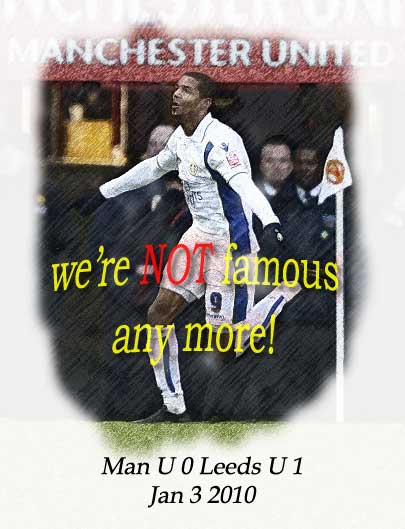 £2.5m.
£2.5m.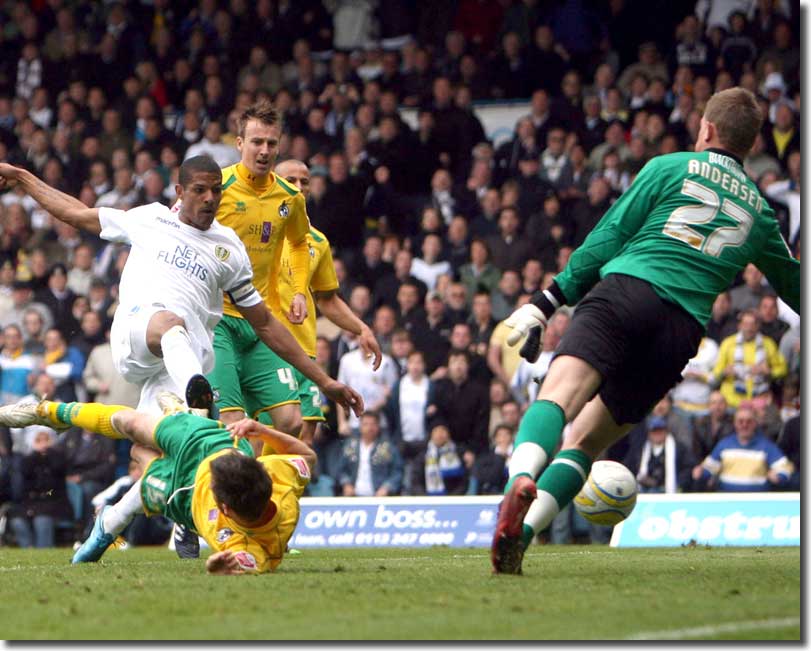 tish
international striker Ross McCormack.
tish
international striker Ross McCormack.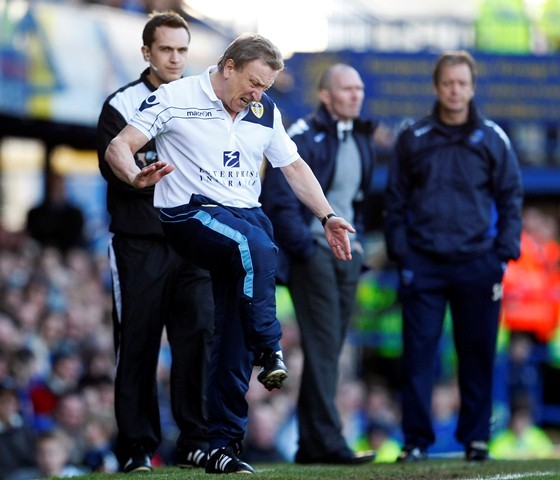 Warnock
played his part at the break with an impromptu team talk, inspiring a
second half fightback and a breathtaking 3-2 victory.
Warnock
played his part at the break with an impromptu team talk, inspiring a
second half fightback and a breathtaking 3-2 victory.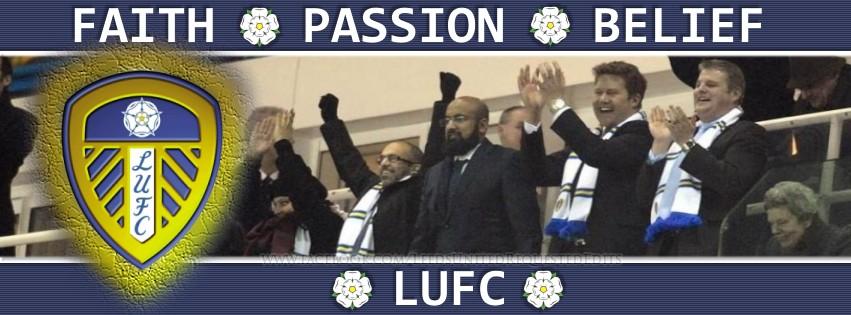 development
squad manager Neil Redfearn placed in temporary charge until a permanent
replacement could be found.
development
squad manager Neil Redfearn placed in temporary charge until a permanent
replacement could be found.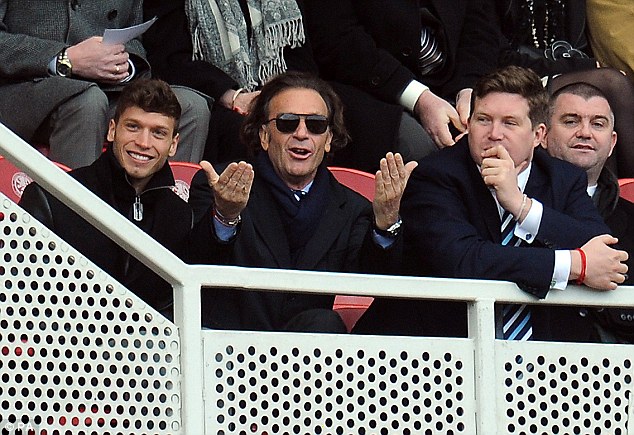 having dispensed with the services of thirty-six during his twenty-two
years as owner of Cagliari. Nevertheless, it came as a shock when Brian
McDermott was sacked, the action taken by Chris Farnell, a lawyer acting
for Cellino, even before the takeover had been completed.
having dispensed with the services of thirty-six during his twenty-two
years as owner of Cagliari. Nevertheless, it came as a shock when Brian
McDermott was sacked, the action taken by Chris Farnell, a lawyer acting
for Cellino, even before the takeover had been completed.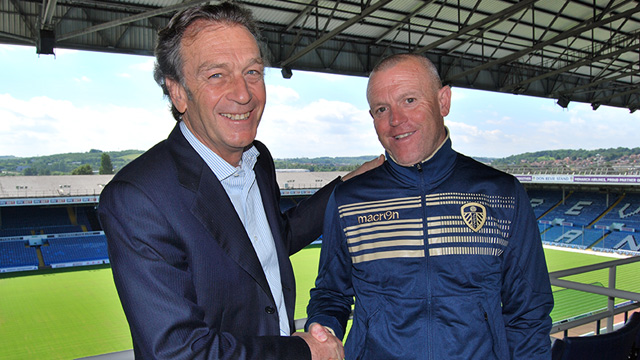 reprieve
and Hockaday was gone after a dismal Capital One Cup defeat to Bradford
City, clearly out of his depth.
reprieve
and Hockaday was gone after a dismal Capital One Cup defeat to Bradford
City, clearly out of his depth.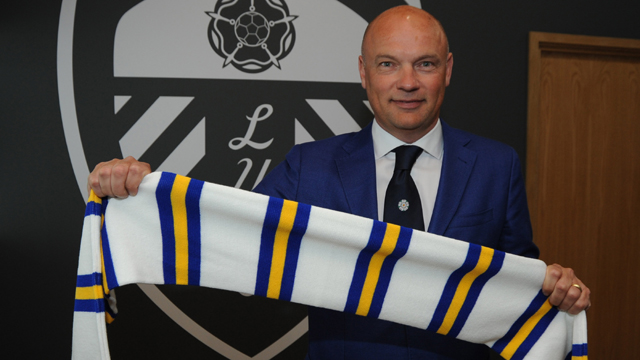 manager.
manager.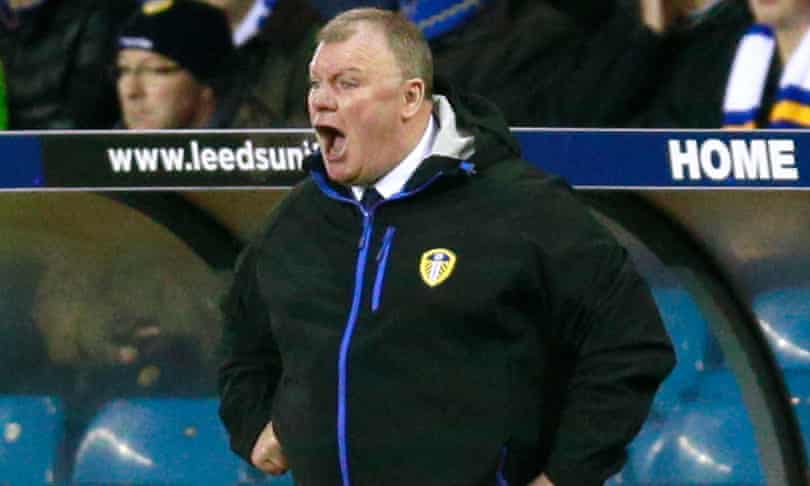 but
the wind had unquestionably gone from his sails.
but
the wind had unquestionably gone from his sails.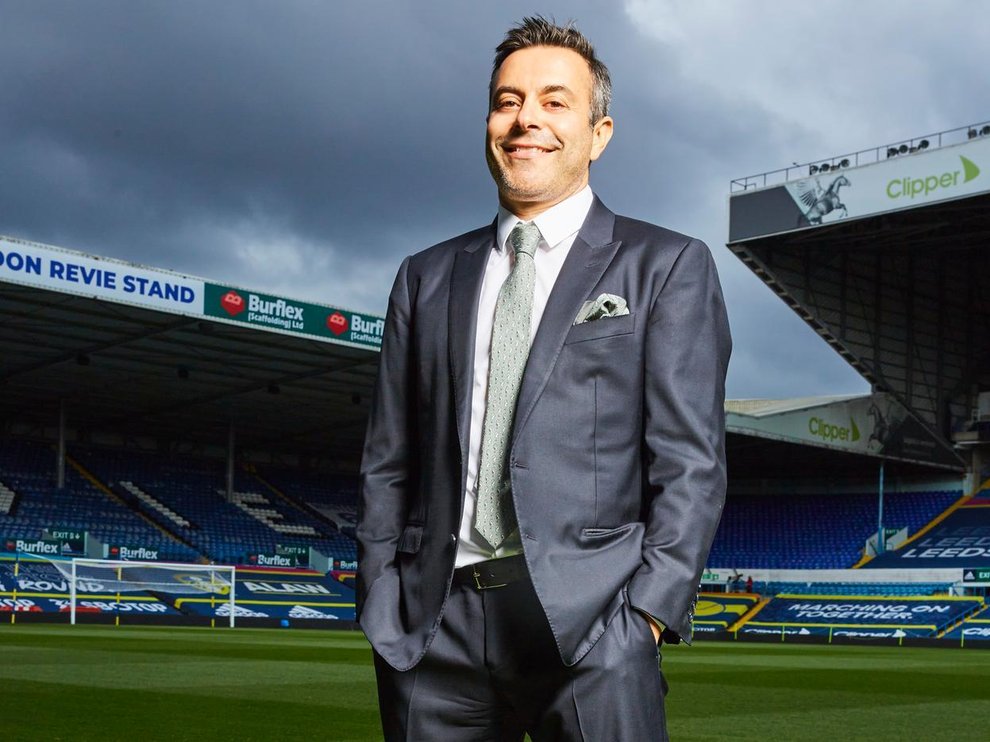 become
the coach of Leeds. He was prepared and for the first time I saw a manager
come in with a Powerpoint and details … This was very important, details
because it means someone is hard-working, in two days he prepared. What
is important to me, what I care about and what I think I have found with
the manager is to have the ambition to win every game. This particular
league is very long and it's important to try and win the game. Eventually
sometimes you might lose it, but you try to win the game.'
become
the coach of Leeds. He was prepared and for the first time I saw a manager
come in with a Powerpoint and details … This was very important, details
because it means someone is hard-working, in two days he prepared. What
is important to me, what I care about and what I think I have found with
the manager is to have the ambition to win every game. This particular
league is very long and it's important to try and win the game. Eventually
sometimes you might lose it, but you try to win the game.'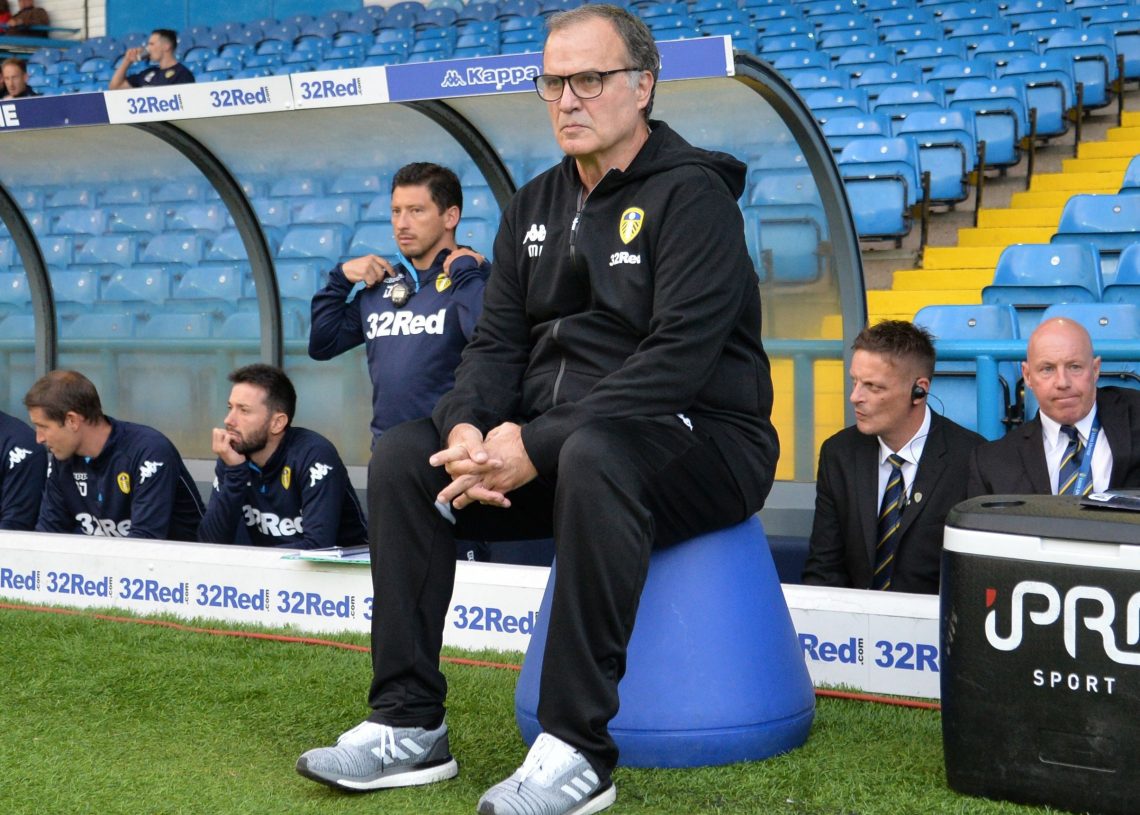
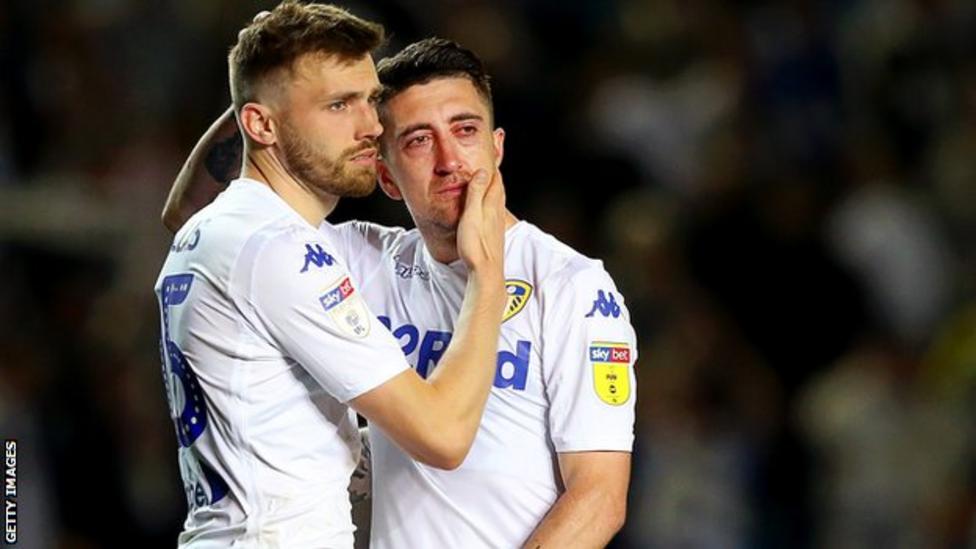 after clashing with Bamford and Conor Hourihane grabbing Klich by the
throat. When things settled down, Bielsa instructed his players to allow
Villa to score straight from the restart. Jansson did not appreciate the
gesture and attempted to tackle Albert Adomah but failed United had a
numb and empty feeling, the supporters knowing that their men had thrown
away their best chance of promotion since 2004.
after clashing with Bamford and Conor Hourihane grabbing Klich by the
throat. When things settled down, Bielsa instructed his players to allow
Villa to score straight from the restart. Jansson did not appreciate the
gesture and attempted to tackle Albert Adomah but failed United had a
numb and empty feeling, the supporters knowing that their men had thrown
away their best chance of promotion since 2004.